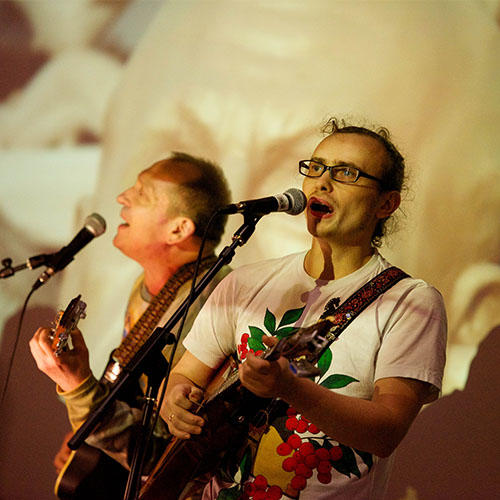University hosts cultural event to celebrate Russian studies
East met West this week through a mutual love of The Beatles as the University of Central Lancashire (UCLan) welcomed a Fab Four tribute band all the way from Russia.
Russian musicians, poets and a sculptor from Tomsk State University came to perform some of The Beatles’ biggest hits in Russian to celebrate Russian studies at UCLan and to show how mutual appreciation of music can transcend cultural differences. Leonty Usov, a famous sculptor from the Siberian university’s city, also brought four busts of the famous four carved from cedar wood to the event. The artwork has now been donated to The Beatles Story museum in Liverpool.
"We were privileged to host this very special concert. This intercultural dialogue was met with delight by an enthusiastic audience of both English and Russian speakers."
Dr Olga Tabachnikova, lecturer in Russian Studies at UCLan, organised the evening. She said: “We were privileged to host this very special concert. This intercultural dialogue was met with delight by an enthusiastic audience of both English and Russian speakers. The sculptures made a real impression on the spectators, and the concert, involving Russian balalaika, demonstrated that real art knows no boundaries.”
The event, supported by the School of Language and Global Studies, also provided a number of creative opportunities as UCLan music students Chris Graves and Sam O’Brien performed with the Russian musicians on bass and drums respectively.
Dr Tabachnikova added: “We received invaluable support from the University’s technicians, specifically Toby Gregory, and staff and students from the School of Art, Design and Performance who not only helped with the music but also filmed the whole event for us. I’d like to particularly thank film student Chloe Stead for her involvement and also Daphne Saunders and Terry Quinn for generously hosting our Russian guests overnight. It was a great evening to celebrate The Beatles’ long-lasting legacy and show that political upheaval can and should be mended through cultural communications.”


